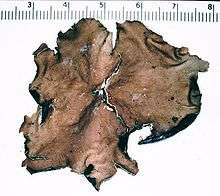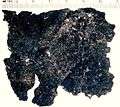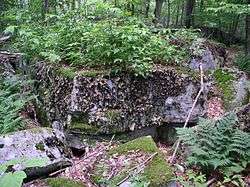Umbilicaria mammulata
| Umbilicaria mammulata | |
|---|---|
 | |
| Herbarium specimen of U. mammulata | |
| Scientific classification | |
| Kingdom: | Fungi |
| Division: | Ascomycota |
| Class: | Lecanoromycetes |
| Family: | Umbilicariaceae |
| Genus: | Umbilicaria |
| Species: | U. mammulata |
| Binomial name | |
| Umbilicaria mammulata (Ach.) Tuck. | |
Umbilicaria mammulata, or Smooth Rock Tripe, is a foliose lichen found on boulders and rock walls.[1][2]
Appearance
U. mammulata is among the largest lichens in the world. The thallus of U. mammulata is usually 4 to 15 centimeters in diameter, but specimens have been known to reach 63-centimetre (2.07 ft) in the Smoky Mountains of Tennessee.[2] The smooth upper surface is a reddish-brown to grayish-brown color and the lower surface is pitch black.
Ecology
This species is found on boulders and steep rock walls in forests and around lakes. It grows on several types of rock substrate, such as acid rock, sandstone, quartz, and granitic rock.[3] Like most lichens, U. mammulata is sensitive to air and water quality. If conditions are optimal, seeing rocks or cliffs covered in dinner plate sized thalli is not unusual.[2] However, it has been suggested that U. mammulata is not as sensitive to pH and water quality as it is to the frequency and duration of precipitation.[4]
Gallery
- U. mammulata growing on a rock on Pratt Mountain.
 The smooth upper surface of U. mammulata.
The smooth upper surface of U. mammulata. The black bottom surface of U. mammulata.
The black bottom surface of U. mammulata. U. mammulata on sandstone blocks in Otter Creek Wilderness, West Virginia.
U. mammulata on sandstone blocks in Otter Creek Wilderness, West Virginia.
References
- ↑ Walewski, Joe (2007). Lichens of the North Woods. City: Kollath-Stensaas. ISBN 0-9792006-0-1.
- 1 2 3 Brodo, Irwin (2001). Lichens of North America. New Haven: Yale University Press. ISBN 0-300-08249-5.
- ↑ Wisconsin State Herbarium, "Wisconsin Vascular Plants: Details Page." http://www.botany.wisc.edu/Wislichens/scripts/detail.asp?SpCode=UMBMAM (accessed Dec 19, 2008).
- ↑ Bailey, Christine; D.W. Larson (1982). "Water Quality and pH Effects on Umbilicaria mammulata (Ach.) Tuck.". American Bryological and Lichenological Society. American Bryological and Lichenological Society. 85 (4): 431–437.